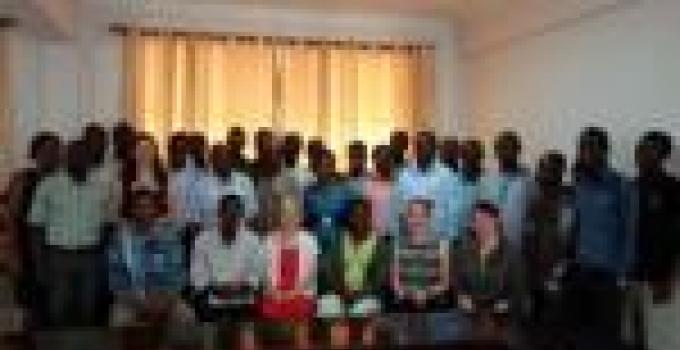KNUST wins DFID-Royal Society Award
Main page content

Out of a total of five consortia which won the first round of the DFID- Royal Society Awards, KNUST is part of three (3). Three senior members from KNUST namely Drs Evans Adei and Johannes A. M. Awudza from the Department of Chemistry and Dr. Vincent Logah from the Department of Crop and Soil Science are the leaders of the consortia at KNUST.
Each consortium comprises three African Universities and a UK University. The Royal Society-DFID Africa Capacity Building Initiative is a £15.3 million partnership initiative between the Royal Society and the Department for International Development (DFID) to develop collaborative research consortia between scientists in sub-Saharan Africa. The overall aim of the scheme is to strengthen the research capacity of universities and research institutions in sub-Saharan Africa by supporting the development of sustainable research networks.
Each consortium was awarded an amount of approximately £1.25 million to support their researches over a period of five years. With three awards, KNUST has the highest among the fifteen African and five UK universities. These researchers are partnering other experienced researchers outside KNUST.
Dr. Adei’s consortium will focus on the theme “New materials for a sustainable energy future: linking computation with experiment. The collaborative research and training initiative will develop and employ state-of-the-art computational techniques and synthesis/characterization methods to design and optimise new catalysts and organic semi-conductors for renewable energy applications.
Dr. Awudza’s consortium on the other hand is focusing on the theme “Developing materials for applications in solar cells”.The key aspect of the consortium’s research programme is the development of new simple routes to nanomaterials and novel graphene/quantum dot nanocomposites, understanding and controlling their growth, processing into films and potential use of these materials in energy applications such as solar cells.
The theme for Dr. Logah’s consortium is “The science underpinning the West African forest-island phenomenon”. The programme aims at strengthening African capacity in soil geochemistry.
As part of the implementation of these projects, the Capacity Research Unit (CRU) of the Liverpool School of Tropical Medicine (LSTM), University of Liverpool, is to monitor and assess the contribution of the Africa Capacity Building Initiative in developing sustainable research and research training capacity. As a result, a team from the CRU of LSTM visited KNUST to hold a capacity building workshop with different stakeholders. The team was led by Professor Imelda Bates with Dr. Stefanie Gregorius, Ms Lorelei Silvester and Ms Laura Dean as other members of the team.
During the workshop, the team outlined the main focus of their work with respect to capacity building and how these can help in strengthening capacity for graduate training in the beneficiary institutions.


